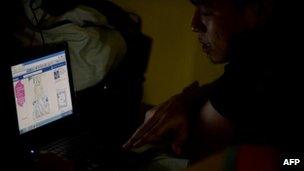Philippine cybercrime law takes effect amid protests
- Published
- comments

Under the new act, someone found guilty of libellous comments online could be fined or jailed
A controversial law targeting cybercrime in the Philippines has come into effect, fuelling protests by citizens and media groups fearing censorship.
The new law, called the Cybercrime Prevention Act of 2012, was signed by the president on 12 September.
It is intended to prevent cybersex, online child pornography, identity theft and spamming, officials say.
But it also makes libel a cybercrime punishable by up to 12 years in jail.
The act was enacted by congress "to address legitimate concerns" about criminal and abusive behaviour online, presidential spokesman Edwin Lacierda said in a statement, external on Wednesday.
"Questions have been raised about the constitutionality of certain provisions of the act. We recognise and respect efforts not only to raise these issues in court, but to propose amendments to the law in accordance with constitutional processes," he said.
The act took effect despite the protests by those who oppose the law.
At least eight petitions from various groups challenging its constitutionality have been filed with the highest court in the Philippines, local media report.
Anonymous activists have hacked into government websites, journalists have held rallies and many Facebook users have replaced their profile picture with a blank screen, says the BBC's Kate McGeown in Manila.
Protesters say the legislation, external could be used to target government critics and crack down on freedom of speech.
Under the new act, a person found guilty of libellous comments online, including comments made on social networks such as Facebook and Twitter or blogs, could be fined or jailed.
Government officials will also have new powers to search and seize data from people's online accounts, says our correspondent.
The US-based Human Rights Watch said that the law would harm free speech in a statement last week, external.
"The cybercrime law needs to be repealed or replaced," said the group's Asia director, Brad Adams.
"It violates Filipinos' rights to free expression and it is wholly incompatible with the Philippine government's obligations under international law."
- Published20 September 2012
- Published11 May 2011
- Published3 March 2011